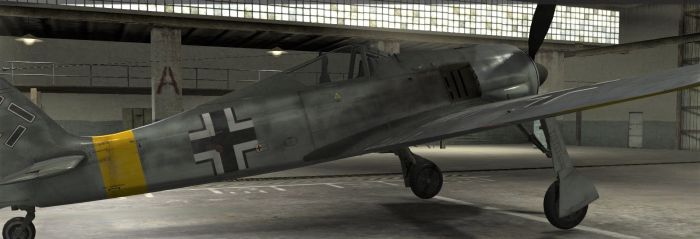Fw 190 A-3: Difference between revisions
Jump to navigation
Jump to search
QuantumCycle (talk | contribs) No edit summary |
QuantumCycle (talk | contribs) No edit summary |
||
| Line 14: | Line 14: | ||
:Flat out top speed at sea level: 560km/h. | :Flat out top speed at sea level: 560km/h. | ||
= Flying the 190 A-3= | = Flying the Fw 190 A-3= | ||
== Out of combat == | == Out of combat == | ||
=== Startup and taxi === | === Startup and taxi === | ||
| Line 40: | Line 40: | ||
*Suffers from nasty [https://youtu.be/pDRkcKSpX5I accelerated stalls] if your AOA gets too high. | *Suffers from nasty [https://youtu.be/pDRkcKSpX5I accelerated stalls] if your AOA gets too high. | ||
= Flying against the 190 A-3 = | = Flying against the Fw 190 A-3 = | ||
=== Do this === | === Do this === | ||
Revision as of 13:47, 7 June 2021
The Focke-Wulf Fw 190 A3 is a premium fighter from the Battle of Stalingrad module of IL-2 Sturmovik: Great Battles.
Hangar view
Important facts and figures
Engine management
- Combat power time limit: 30min.
- Emergency power time limit: 3min.
- The Kommandogerät chooses manifold pressure, RPM, mixture, supercharger settings according to the power output set by the pilot (throttle lever).
Airspeed considerations
- Vne: 850km/h.
- Stall speed without flaps: 166-189km/h.
- Stall speed with flaps: 166-172km/h.
- Flat out top speed at sea level: 560km/h.
Flying the Fw 190 A-3
Out of combat
Startup and taxi
- Throttle 10-15%.
- Begin engine startup sequence.
- For taxiing, be aware that the tailwheel only locks if the stick is pulled back, therefore the plane will need careful handling on the ground (pull the stick to taxi straight).
Takeoff
- Pull the stick back and hold it there.
- Smoothly throttle up to full power.
- Once sufficent speed is reached, release the stick and let the tail wheel lift.
- Once sufficeient speed is reached, lift off normally.
Climb
Cruise
Landing
In combat
Overall
Strengths
- Controls remain responsive at high speed.
Weaknesses
- Suffers from nasty accelerated stalls if your AOA gets too high.



